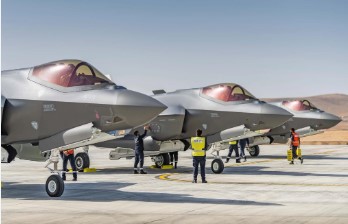Turkey has long wanted to modernize its aging fleet of fighter jets. One of the top choices for that upgrade is the F-35 Lightning II, a powerful stealth aircraft developed by the US-based company Lockheed Martin.
US-Turkey Tensions Sparked by F-35 Ambitions
Turkey was once a part of the global team building these jets and even helped make nearly 900 parts for them. It also paid $1.4 billion in advance for the program. But everything changed when Turkey decided to buy a Russian-made missile system called the S-400.
The United States quickly responded by removing Turkey from the F-35 program in 2019. The US government said the Russian system could be used to gather secret information about the F-35’s advanced technology. As a result, Turkey was not only blocked from buying the aircraft but also faced sanctions under a law known as CAATSA.
Even after these events, Turkey continued to push for the chance to buy the F-35. It also started working on its own fifth-generation stealth fighter named KAAN, which it hopes to fly by 2028. However, Turkey didn’t give up on the American jet. The demand for the F-35 gained fresh energy when the US approved a sale of the same jets to Greece, a long-standing rival of Turkey in the region.
Deadly US F-35 Deployment Escalates Conflict with Houthis in the Middle East
In recent months, there have been signs that the US might be warming up to the idea of selling F-35s to Turkey again—under one condition: Turkey must find a way to make its S-400 system unusable. Options considered include dismantling the system or moving it to a US-controlled base. Although Turkey has never officially activated the S-400 in its defense system, it has carried out tests in the past.
Reports also suggest that Turkey is considering setting up the S-400 system at a military base in Syria to build a layered air defense system. If this happens, it may create more obstacles for its goal of buying the F-35s.
Israel’s Cautious Eye on Turkey’s Growing Power
While Turkey continues its efforts, a strong opposition has emerged. Israel is reportedly trying to stop the US from selling the F-35 jets to Turkey. According to recent reports, Israel has been using its political strength to influence American decision-makers. Israeli officials are said to be concerned about Turkey’s growing role in Syria and the broader Middle East.
Snubbed by F-35 Deal, Saudi Arabia Fractures Global Fighter Jet Alliances with GCAP Pivot
Israel is the only country in the Middle East currently operating the F-35, and it wants to keep that advantage. There is a long-standing rule between the US and Israel that any US military equipment sold in the region must not be better than what Israel receives. This rule is called maintaining Israel’s “qualitative military edge.” This agreement has often shaped American decisions about selling advanced weapons in the Middle East.
In one instance, Israeli leaders reportedly held multiple discussions with top US officials in March and April. Their goal was clear: make sure Turkey does not receive the F-35. These conversations reportedly included efforts to influence upcoming meetings between US and Israeli leadership. Israel fears that if Turkey sets up a strong military base in Syria, it could limit the Israeli Air Force’s freedom in that region.
There have even been recent air strikes by Israel on Syrian bases where Turkey was planning to send its troops. This shows how serious the situation has become. Tensions between the two countries over control in Syria are rising, and the F-35 issue is now a central part of this conflict.
F-35 Fighter Jet Program is termed $2 Trillion Disaster
Washington’s Balancing Act Amid Political Pressures
The United States now finds itself in a tricky position. On one side is Turkey, a NATO ally asking for access to the F-35 jets it helped build and paid for. On the other side is Israel, another close ally strongly opposing the sale to Turkey.
In a recent visit by Israeli leadership to the White House, US officials, including the President, offered to mediate the differences between the two countries. The President made it clear that he believes both nations can find a solution, but also emphasized that one side needs to be “reasonable.” Though there is no official confirmation that the F-35 issue was discussed during that visit, it remains at the center of current US diplomacy in the region.
Interestingly, American officials seem to believe that if Turkey can resolve the issue of the S-400 system, the sale of the F-35 may still be possible. This belief was echoed during the previous US administration, which had made similar comments.
Portugal’s Powerful F-16 Jets Replace Costly Dutch F-35s in NATO Baltic Skies Realignment
Despite the complications, Turkey has never officially put the S-400 into regular use. It remains in storage, not included in Turkey’s new ‘Steel Dome’ air defense project, which is designed with modern and domestically made layers of protection. But new reports suggest that Turkey might be planning to set up the S-400 in Syria, which could once again block any chances of getting the F-35.
For now, the F-35 sale remains caught between global politics, regional tensions, and two nations with different goals. Turkey’s strong desire to get back into the program continues, but so does Israel’s effort to keep its edge in the region.

